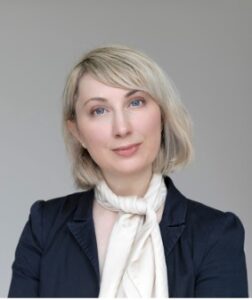Xenia Schäfer
October 2021 – September 2024: Research associate and doctoral candidate in the field of Chemistry Education at FAU Erlangen-Nürnberg.
Title of dissertation: “Interest in the student laboratory – a question of situation or disposition? A mixed methods approach to activity-related assessment of affective factors.”
September 2019 – July 2021: Teacher training (Referendariat) for secondary school teaching (Gymnasium) at the Teacher Training College (Studienseminar) in Ingolstadt
Degree: Second State Examination
October 2013 – March 2019:
Studies in Biology and Chemistry for secondary school teaching (Gymnasium) at FAU Erlangen-Nürnberg
Degree: First State Examination (Erstes Staatsexamen)
During my studies, I was a recipient of the Deutschlandstipendium scholarship. From April 2016 to January 2019, I worked as a research assistant at FAU. During this time, I led tutorials in stoichiometry and assisted in both qualitative and quantitative laboratory courses in inorganic chemistry.
My research focuses on interest development in educational settings. I apply the Experience Sampling Method (ESM) to capture situational interest in typical scientific activities within a student lab environment. The collected data is analyzed using Latent State-Trait analysis to distinguish between personal (trait) and situational (state) influences on variance. Additionally, I conduct photo-elicitation interviews to gain deeper insights into the sources of interest. These qualitative findings are then compared with the quantitative results as part of a mixed methods approach.
- Seminar: Planning, Implementing, and Analyzing Chemistry Lessons in Secondary Schools [DIDCHEM LAG III]“
- Seminar „Practical Exercises in the Student Laboratory(KOAla)“
- Supervision of admission theses (validation of questionnaires through triangulation; influence of experimental escape rooms on interest)
- Classroom observations
Design and management of educational and training programs:
- Student Laboratory Program KOALa: Topic Ocean Acidification, target group 9th/10th grade Realschule.
Children’s University Program “Find Nemo and Save His Home!”: Adapted program on ocean acidification for primary school.
Teacher Training “Escape Rooms in Chemistry Classes – Motivating and Supporting with Puzzles, Locks, and Storytelling”.
Conference presentations:
- ESERA Summer School 2022 (Utrecht): presentation and poster
- GDCP yearly conference 2022 (Aachen): poster
- GDCP doctoral colloquium (Blaubeuren): presentation
- GEBF yearly conference 2023 (Essen): presentation (junior conference) and poster (main conference)
- GDCh Science forum 2023 (Leipzig): Workshop
- GDCP yearly conference 2023 (Hamburg): presentation
- NARST Conference 2024 (Denver): presentation
- Schäfer, X., & Habig, S. (2024). Ein experimentelles Mystery und ein Modellexperiment zur Ozeanversauerung – umgesetzt im Schülerlabor KOALa. CHEMKON. DOI: doi.org/10.1002/ckon.202300065
- Schäfer, X., & Habig, S. (2024, im Druck). Interesse im Schülerlabor – eine Frage von Situation oder Disposition? In H. van Vorst (Hrsg.), Jahrestagung der Gesellschaft für Didaktik der Chemie und Physik 2023: Frühe naturwissenschaftliche Bildung.
- Schäfer, X., & Habig, S. (2023). Aktivitätsgebundene Erfassung motivationaler Faktoren im Schüler:innenlabor. In H. van Vorst (Hrsg.), Jahrestagung der Gesellschaft für Didaktik der Chemie und Physik 2022: Lernen, Lehren und Forschen in einer digital geprägten Welt (S. 770-773).

